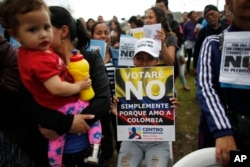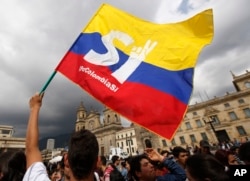Colombian officials met Tuesday in Cuba with representatives from the Revolutionary Armed Forces of Colombia for talks to try and save a peace deal, but it is unclear how willing the rebels are to return to the negotiating table.
In addition to the resumed negotiations with the rebels, Colombian President Juan Manuel Santos will meet with former president Alvaro Uribe, who led the opposition to the peace deal with FARC. Uribe told a Colombian radio station he was willing to provide input on a way forward to peace with FARC and an end to the country's 52-year-old war.
Voters narrowly rejected the deal 50.2 percent to 49.7, or by a margin of just 54,000 votes. Public opinion polls going into Sunday's voting forecast the referendum would pass by a two-to-one margin.
President Santos said he would extend a cease-fire agreement reached with the rebels to October 31, in an effort to facilitate the negotiations.
"Time is very important. We can't prolong this process and this dialogue for a long time because we're in a gray zone, a sort of limbo, that is risky and can wash away the entire process," he said.
The leader of the Revolutionary Armed Forces of Colombia, Rodrigo Londono, who is also known as Timochenko, responded to Santos's offer offer to extend the cease-fire with skepticism.
"And after that the war continues?" the rebel leader said on Twitter.
US praises planned dialogue
In a statement, the U.S. State Department commended the government and people of Colombia "for the democratic process held yesterday and recognizes that difficult decisions are going to have to be taken in the days ahead."
"Colombians have expressed their commitment to settle their differences through institutions and dialogue rather than violence," said spokesman John Kirby. "Colombia can count on the continued support of the United States as it continues to seek democratic peace."
The United Nations also remains fully committed to the peace process and will continue to help the government reach a deal with the rebels, a U.N. Secretary General Ban Ki-moon said Monday.
Ban also said he has "urgently" dispatched special representative Jean Arnault to the Cuban capital for consultations. "In Carthagena, I witnessed a profound desire of the Colombian people to end the violence. I count on them to press ahead until they achieve, secure a lasting peace," he added.
The peace agreement was aimed at formally ending the 52 year-old uprising by the leftist rebels. The guerrilla war in Colombia has killed more than 220,000 people and driven millions from their homes.
The Santos government had waged a fierce campaign in favor of the peace deal, appealing to the millions of Colombians who say they are sick of war and violence and terrorism.
But the "no" side campaigned just as vigorously against the deal.
A renegotiation of the peace deal seems to hinge on whether rebels would accept tougher terms.
Many "no" voters were genuinely offended that nearly all FARC rebels will avoid prison time for crimes allegedly committed during the uprising and get various financial support from the government.
They are also upset that FARC would be guaranteed seats in the Colombian congress without an election in exchange for transforming FARC into a political party.
Timochenko had publicly asked for forgiveness for whatever harm was committed by the rebels during the long uprising.
The FARC rebellion began as a simple peasant uprising in 1964 and soon grew into a major threat to various Colombian obtainments over the next five decades.
It used drug trafficking as a major source of funding. Kidnapping politicians and foreigners and holding them hostage in remote jungle hideouts was a FARC trademark.
The United States spent billions of dollars in military aid to help the Colombian government combat FARC and bring it to the negotiating table.







